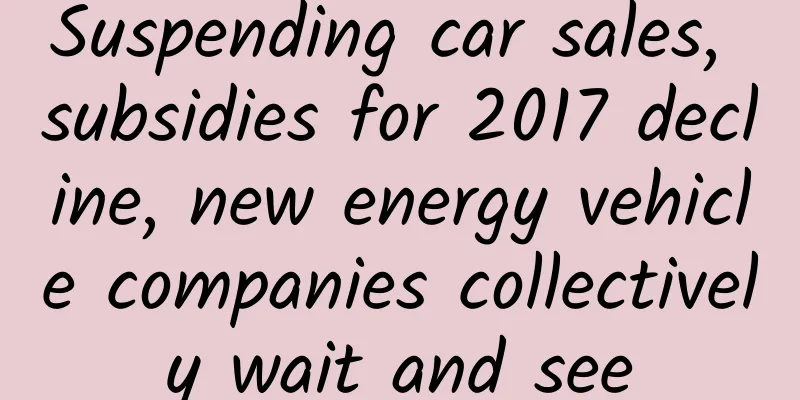Suspending car sales, subsidies for 2017 decline, new energy vehicle companies collectively wait and see

|
New energy vehicle companies are considering whether to bear the increased costs after the subsidy reduction, and have been slow to announce pricing, and dealers are only accepting reservations but not selling cars. Price not yet determined, new energy vehicle sales suspended As the quota is about to expire, consumers who want to buy a new energy vehicle quickly are particularly anxious recently. The reporter visited the market and found that the current new energy vehicle manufacturers are still waiting and considering whether to bear the rising costs after the subsidy reduction. Due to the delay in announcing the 2017 pricing, some car companies have even suspended the production of new energy vehicles. Affected by the above factors, the sales of new energy vehicles in Beijing have almost stagnated. For some indicators that are about to expire, consumers who are eager to buy a car can only sign a pre-sale contract with the dealer and have to wait until the final selling price is announced before they can get the car. Some consumers even face the risk of abandoning their license plate. Citizens' narration The car purchase quota is about to expire and I can’t buy a new energy vehicle At the end of 2016, Mr. Zhao, a citizen, booked a new energy vehicle, the Denza 400, at a 4S store, but he has been increasingly anxious recently. He told reporters that his new energy vehicle quota was about to expire on February 26, and time was running out, but the 4S store still could not sell him the car. In addition, in order to wait for this new energy vehicle, Mr. Zhao did not buy other models that were available in time, and missed out on higher subsidies. He cited a certain brand of new energy vehicle as an example, saying that in 2016, it received a total of 110,000 yuan in central and local subsidies. After the new subsidy policy was released in 2017, the subsidy for this car was reduced to 66,000 yuan, "which is equivalent to a 44,000 yuan increase in the price of the car." Mr. Zhao originally just wanted to wait patiently to buy a car he liked, but he didn't expect that the entire new energy vehicle market would be different this New Year. "After the pre-sale price of the Denza 400 was announced in 2016, it was not included in the new energy vehicle catalog, so the 4S store couldn't sell the car." Mr. Zhao said that the salesperson at the time kept comforting him, saying that even if the subsidies were reduced in 2017, the final price of the Denza 400 should not be too different from other models, "so I decided to wait until the new batch of catalogs were announced this year before buying it." But what he didn't expect was that he couldn't buy any car after waiting so long. Mr. Zhao said that because he couldn't buy the car he wanted, he began to turn his attention to other brands of new energy vehicles in order to keep his quota. At this time, he found that no new energy vehicle dealer could promise to sell him a car before February 26. "Most of these brands have cars in stock, and the vehicles have a clear market guide price, but like the BYD 400, they are only accepted for reservation and are not for sale for the time being." Mr. Zhao said that the only thing he can do now is to find a way to "extend the bid", but if it doesn't work, there is nothing he can do. Market Visit The car company has not specified the price and the dealer only accepts reservations The reporter found through field visits that not only new cars like the Denza 400, but also the Emgrand EV, which has been on the market for some time, has not given a clear sales price. In a Geely Auto 4S store near the East Fifth Ring Road, the reporter asked the price of an Emgrand EV Elite model on display in the store as a consumer. Interestingly, two salesmen in the same store gave different answers. One of the male salesmen pointed to the label on the front windshield of the exhibition car and said: "129,800 yuan fixed price". After hearing this, another female salesperson avoided the reporter and made a phone call. When she came back, she told the reporter clearly that the current price of this car has not been determined. 129,800 yuan is determined according to the subsidy standard in 2016, which is the price after deducting 110,000 yuan in subsidies from the guide price. The female salesperson said that the subsidy policy has changed this year. If the reporter wants to buy it, he can only make a reservation first, and then refund or supplement after the manufacturer determines the price. The situation is similar to many main models in the new energy vehicle market in the past two years, such as BYD E6, BYD Qin EV300, BYD e5300, BAIC New Energy EU260, BAIC New Energy EX200, and BAIC New Energy EV160. Currently, there is no clear selling price and only reservations are accepted. That is to say, when consumers go to the store to buy new energy vehicles and ask about the price, the dealer can only give a "I can't say" response. Therefore, new energy vehicle dealers in Beijing now sign pre-sale contracts with consumers. The contract content almost always clearly stipulates that the selling price is based on the price after subsidies in 2016. Once the new selling price is announced, consumers can pay the balance if they think it is acceptable. If it exceeds psychological expectations, the seller will refund the deposit in full. Policy Exploration Car companies are collectively waiting to re-sort out pricing The reporter learned that the main reason for the above situation is that at the end of 2016, the state clearly stated that the subsidies for new energy vehicles in 2017 would be reduced by 20% from 2016, and at the same time set a cap on local financial subsidies that must not exceed 50% of central financial subsidies. In addition, Beijing has not yet announced a new batch of new energy vehicle catalogs and specific subsidy measures. Just like the example Mr. Zhao gave, consumers who bought a certain model in 2016 could get a subsidy of 110,000 yuan, but in 2017 they could only get a maximum of 66,000 yuan. For new energy vehicle manufacturers, if they still sell at the 2016 guide price, with the reduction of subsidies, the terminal car price will rise sharply, which is likely to be difficult for consumers to accept. So now car companies are collectively waiting and waiting for local subsidies to be clarified, and then re-sorting out pricing to adapt to market demand. Therefore, the new energy vehicle market in Beijing is almost stagnant. If the manufacturer does not set the price, the dealer cannot sell the car. In order to reduce the operating costs during this period, Jianghuai Automobile Laiguangying Store has stopped purchasing new energy vehicles from manufacturers. Currently, the only new energy models in its store are two iEV4s that were left over from 2016. Some car companies have stopped the production of new energy vehicles from the source, waiting to resume production after the new subsidy policy is clarified. Reporter's question The market will see a reshuffle, and mainstream companies will not rashly raise prices As the vehicle price is unclear, the reporter found that some dealers gave various catalog release dates in order to retain orders, some said February 26, and some said mid-March. Yesterday afternoon, the reporter called the relevant person in charge of the Beijing Municipal Commission of Economics and Information Technology, and the reply he received was that the release time of the new energy vehicle catalogue is irregular every year, and the release time of this year's catalogue has not yet been determined. Zhao Qiang, vice president of sales and marketing at United Electric, said that this is only a temporary phenomenon. Once the policy becomes clear, the new energy vehicle market will usher in a new reshuffle. Mainstream companies with comparable strength will not rashly raise car prices. After all, compared with 2010, today's production costs have been greatly reduced. Naturally, they will not and should not pass on all the costs after the subsidy reduction to consumers. Car companies respond Willing to bear subsidies to reduce costs and promote internal cultivation When relevant local policies are implemented, will companies take the initiative to bear the cost of reduced subsidies? In this regard, an insider of Geely Auto said that car prices should be reduced, but the extent of the reduction will depend on how much cost the company bears. "What is certain is that at this stage most companies are willing to pay this money. The reason is very simple. The new energy vehicle market is not yet good, and consumers may not be able to accept the price increase of cars. After all, over the years, new cars have been getting cheaper and cheaper, and there is no example of them becoming more and more expensive." The person said. He also pointed out the pain point of the industry, which is that when subsidies are high, everyone is thinking about earning subsidies and often ignores the improvement of their own research and development capabilities. Up to now, most of the parts of many vehicle manufacturers are still purchased from others, which has led to a situation where the industry lacks competition and there is a market but no price. On the other hand, if subsidies are reduced, it can encourage companies to focus on the cultivation of internal strength, so that the market can form real competition and price cuts will be more natural. Expert interpretation Subsidies are still considerable after the reduction, and automakers should actively give back to the market Regarding the current status of the new energy vehicle market, Wang Binggang, head of the National 863 "Energy Saving and New Energy Vehicle" Major Project Supervision and Consulting Expert Group, said that this is only a temporary phenomenon. Once the relevant policies of Beijing are clarified, a new round of competition among enterprises will follow. By then, the question of whether the car prices that people are concerned about will rise will also have a clear conclusion. Wang Binggang mentioned that among the 150,000 passenger car quotas in Beijing this year, 90,000 are ordinary quotas and 60,000 are demonstration and application of new energy quotas, both of which are the same as in 2016. In other words, the number of traditional fuel vehicles is no longer decreasing, and the number of license plates for new energy vehicles has not increased. The market demand is the same as last year. At the same time, it is undeniable that the reduction in subsidies will, to some extent, discourage some consumers from purchasing. In his opinion, the purchase price of cars may increase slightly after the subsidy is reduced, but the corresponding costs should not be passed on to consumers in full, which is not beneficial to the development of the market. Wang Binggang believes that manufacturers should take the initiative to bear some of the subsidy costs. The reason is not only to promote the development of the market, "More importantly, through the support of many national policies, the production costs of enterprises have dropped rapidly, and it is time to give back to the market." Wang Binggang introduced that most of the high subsidies from the state over the years have been paid for batteries, and the cost of batteries accounts for more than 50% of the cost of a new energy vehicle. He mentioned that the output of batteries was indeed very small in the early stage of the industry's development, and the investment in research and development, equipment, etc. was also very large. Many battery companies must recover their costs from the selling price of batteries, and the price they sell to vehicle manufacturers will also be relatively high. "But in the past two years, the development of batteries has been very rapid, and the cost has also dropped rapidly. There has been obvious progress in both performance and cost-effectiveness." Wang Binggang said that even if the central government subsidies have dropped by 20%, the reduced subsidies are still very considerable for enterprises. At this time, giving benefits to the people is not only beneficial to the long-term development of the industry, but also beneficial to the improvement of the competitiveness of the enterprises themselves. In addition, some industry analysts believe that the reduction in subsidies is the beginning of the market gradually replacing the government's role. Some companies that rely too much on subsidies may be eliminated by the market, and competition among companies will gradually intensify. As a winner of Toutiao's Qingyun Plan and Baijiahao's Bai+ Plan, the 2019 Baidu Digital Author of the Year, the Baijiahao's Most Popular Author in the Technology Field, the 2019 Sogou Technology and Culture Author, and the 2021 Baijiahao Quarterly Influential Creator, he has won many awards, including the 2013 Sohu Best Industry Media Person, the 2015 China New Media Entrepreneurship Competition Beijing Third Place, the 2015 Guangmang Experience Award, the 2015 China New Media Entrepreneurship Competition Finals Third Place, and the 2018 Baidu Dynamic Annual Powerful Celebrity. |
Recommend
How to manage private domain traffic and membership operations?
The cost of entering the second level has skyrock...
28 essential thinking models for Xiaohongshu operation
1. Xiaohongshu advertising methodology This deliv...
What products are suitable for Baidu promotion? Is Baidu promotion easy to do?
Baidu covers 95% of Chinese Internet users. Inter...
Mazda to launch new energy vehicle series from 2021
According to overseas media reports, Mazda offici...
Will keeping long hair during pregnancy take away nutrients from the baby? Stop torturing pregnant women...
gossip "Will long hair compete with the baby...
Night Grass and Chollima 7-day Case Study Practice Training Camp 14th
Night Grass and Chollima 7-day Case Study Practic...
Features and display forms of Phoenix.com splash screen ads and information flow ads
The threshold for advertising on Phoenix.com is l...
Mobile clothing photography tutorial "The first photography system course for clothing people" video teaching
Course Contents: 1. The first photography system ...
"Water Drop Fairy" takes you into the world of "invisible water"
"Water droplets" are H2O, and they are ...
Don’t want to drink milk? Try these “milk substitutes” →
For most people of this generation, the main sour...
5 health care misunderstandings that deceived parents, you will regret it now
Our parents gave us life and everything good. Whe...
What should you do to plan an event that will go viral on WeChat Moments?
How to create an event that will go viral on WeCh...
Why do some people look old and some look young? The reason has finally been found
In our lives, some people seem to have "eate...
The latest picture of Yutu-2 is released! Sending you New Year's greetings!
"Yutu" is here to wish you a happy new ...
Tik Tok account monetization strategy!
Now that you have fans and traffic, how do you mo...









